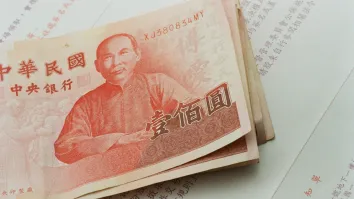
Hong Kong banks bear the brunt of China's crisis
Analysts remain bearish amidst weak growth in China and plans of further monetary tightening in the US.
Hong Kong’s growing links with the mainland are exposing it to a possible financial contagion amongst China’s closest trade partners. Hong Kong remained stable over the past several years despite recent financial crises that have crippled other economic hubs within Europe and the Americas. Now, Hong Kong’s stability is threatened by China’s rocky economic shift, stretched property prices, and high private sector leverage.
Analysts remain bearish amidst weak growth in China and plans of further monetary tightening in the US.
Hong Kong's growing links with the mainland are exposing it to a possible financial contagion amongst China's closest trade partners. Hong Kong remained stable over the past several years despite recent financial crises that have crippled other economic hubs within Europe and the Americas. Now, Hong Kong's stability is threatened by China's rocky economic shift, stretched property prices, and high private sector leverage.
Analysts remain bearish amidst weak growth in China and plans of further monetary tightening in the US.
Hong Kong's growing links with the mainland are exposing it to a possible financial contagion amongst China's closest trade partners. Hong Kong remained stable over the past several years despite recent financial crises that have crippled other economic hubs within Europe and the Americas. Now, Hong Kong's stability is threatened by China's rocky economic shift, stretched property prices, and high private sector leverage.
Investors have taken a wait-and-see approach towards the volatile environment. Outside of China, the US Federal Reserve has yet to outline its monetary policy decisions, leaving the Hong Kong financial sector in grim uncertainty.
Meanwhile, banks' increasing exposure to China are leading to greater loan delinquency pressures and higher borrowing costs. Recent economic reports show marked slowdowns in export of goods and tourism and retail sales activities, which in turn reflect weak external demand, in particular, from mainland China.
“Nowadays, the global economy is extremely complicated and financial markets fluctuate more wildly. Some companies have operational difficulties which are structural in nature. In such circumstances, I think the banks in Hong Kong are facing a number of major challenges, namely: how to enhance the capability to control asset quality and withstand risks; how to raise the standards of business management and how to strengthen the overall capability to serve customers,” says Jiang Yisheng, executive director and chief executive officer of ICBC (Asia).
The China connection
Paul McSheaffrey, partner, head of banking, Hong Kong at KPMG China, says that banks in Hong Kong will be keeping a watchful eye on China's growth. Alongside this major challenge are the implications of Brexit concerns and the upcoming US elections in November. Analysts expect that the bleak outlook will persist in the next few years and will be exacerbated by deteriorating loan quality in mainland China and the expectation that the US will begin another rate-hike cycle.
The territory cannot easily pull away as mainland firms and banks snap up local assets and set up shop in the city. It is in fact a willing party, as it was the most significant transporter of exports and imports from China. The slowdown in the mainland's economy has thus impaired trade numbers in the city.
“The subsidiaries and branches of mainland banks continue to take market share in Hong Kong and the interconnectedness between their parent banks and their weaker intrinsic strength adds confidence-risk to the system. We believe high volatility in CNH interbank interest rates, due to the less developed nature of this market, raises the perceived risks,” said Ivan Lin, associate director, financial institutions, Fitch Ratings.
Despite the challenges posed by China's slowdown, Hong Kong believes that it can keep the connection going, especially with regard to the fintech market. Banks in the city continue to forge partnerships with fintech companies, accelerators, and incubators in view of innovation demands and the overall goal for Hong Kong become a leader in the fintech space.
“With regard to the link to the mainland, Hong Kong's Secretary for Financial Services and the Treasury recently signed an agreement with the Shanghai Municipal People's Government to deepen our financial cooperation. One of the priority areas we are trying to work more closely together is in fintech. Regulators on both sides can openly exchange experience and views on regulatory issues, and the government will also facilitate local and foreign fintech companies based in Hong Kong to explore the mainland market, and vice versa,” says Kent Yau, head, research office, Financial Services and the Treasury Bureau.
Property pains
After a peak in late 2015, Hong Kong's property market prices have begun falling. Average residential prices are now at 11% below their peaks in September 2015. However, current rental yields remain at multi-year lows. Sherry Zhang, analyst at Moody's Investors Service, says that these prices could come down further on the current sluggish labour market outlook and an increasing supply pipeline.
However, an accelerated fall in property prices could further discourage private sector demands and erode the banks' collateral buffer.
Zhang further notes that mortgages do not necessarily represent a central risk in the baseline scenario due to the macroprudential measures that the Hong Kong Monetary Authority has implemented in recent years. However, if property prices fall sharply, mortgages could be exposed to higher delinquencies and foreclosures, especially on loans where the borrowers have added to their overall leverage by re-mortgaging their properties or taking out second-lien mortgages.
“The first half of 2016 saw an increase in the non-performing loans of some of the city's major banks. Problem loans will continue to rise with the combined effects of a slower Hong Kong economy and the possibility of higher interest rates, thereby adding pressure to loan delinquency,” says Yisheng.
Capital buffers
Despite the largely gloomy outlook for Hong Kong's economy, analysts have identified one bright spot which can keep the territory afloat for a whilst Hong Kong banks will continue to maintain good capital buffers over the next 12 to 18 months, in preparation for more stringent regulatory requirements and despite the looming rise in non-performing loans.
Fitch adds that Hong Kong banks' general loan reserves and the phase-in of a 2.5% countercyclical capital buffer give banks a significant cushion against loan deterioration.
“The system's common equity tier 1 ratio (CET1) improved to 14.6% at end-March 2016 from 13.7% at end-2014. Likewise, its total capital ratio rose to 18.2% at end-March 2016, up from 16.8% at end-2014. These ratios are well above the Basel III minimum requirement. In addition, the banks started to report Basel III leverage ratios in 2015, which are also well above the regulatory minimum of 3%,” Zhang says.
Liquidity risks will also be well-managed, as banks enjoy large liquid assets and funding structures. Zhang adds that the banks' sound liquidity positions will continue to support their balance sheet strength and credit profiles, despite economic pressures. She adds that on a global scale, Hong Kong banks have among the highest baseline credit assessments (BCAs) on a weighted average basis, which in turn support their high ratings.
Hong Kong banks are also awaiting the implementation of a resolution regime that would allow creditor bail-in. Zhang believes that the government's intention to minimise the use of public funds to resolve failing financial institutions implies a lower likelihood of government support for the banks. Authorities
are then enabled to take earlier resolution actions, which will likely better preserve the value of the banks' assets when compared with disorderly liquidations.



















 Advertise
Advertise









